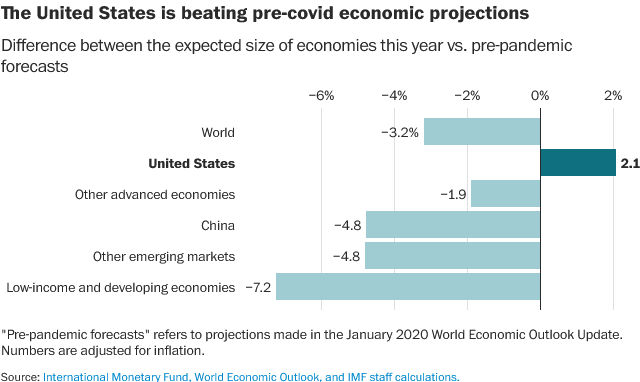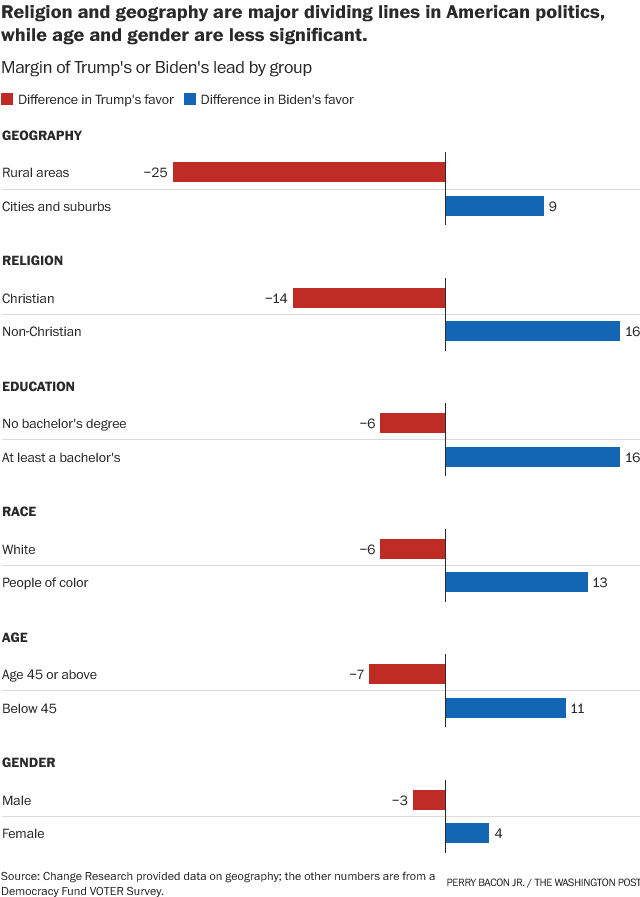After three days summarizing recently read nonfiction books, today let’s capture recent items from the news.
- A conservative blames the unpopularity of an ice cream flavor on Biden;
- Conservatives are eager to impose Christian indoctrination in Florida and Texas;
- Paul Krugman identifies overflowing septic tanks as another unanticipated effect of climate change;
- Two pieces about how and why so many people believe wrong things about the economy, and how the blue vs. red divide is about more than race and education; with charts;
- Listening again to Enya, with two tracks from her first album… floating in her ethereal realm.
*
First up: an absurd example of how conservatives blame everything they perceive as negative on people they don’t like.

Joe.My.God, 28 May 2024: Newsmax: Biden Made Ice Cream Flavor Unpopular
\\
Conservatives complain about indoctrination, but do it themselves. In the terms of yesterday’s book, it’s all about which story is being told. This is what the Founders apparently meant to avoid. But human nature does not change, and idealism eventually gives way to base human nature.

Joe.My.God, 28 May 2024: Florida Educators Train To Teach Christian Nationalism
And
Friendly Atheist, Hemant Mehta, 27 May 2024: The Texas GOP’s proposed platform would force the Bible in schools, subtitled “The Texas Republican Party’s agenda contains everything on conservative Christians’ wishlist”
\\

Paul Krugman, NY Times, 27 May 2024: The Stench of Climate Change Denial
How many people out there still deny the effects of climate change? Well, probably a lot, especially the MAGA crowd. Even as the effects rise up around them. Krugman begins:
This may sound a bit weird, but when I think about my adolescent years, I sometimes associate them with the faint smell of sewage.
You see, when I was in high school, my family lived on the South Shore of Long Island, where few homes had sewer connections. Most had septic tanks, and there always seemed to be an overflowing tank somewhere upwind.
Most of Nassau County eventually got sewered. But many American homes, especially in the Southeast, aren’t connected to sewer lines, and more and more septic tanks are overflowing, on a scale vastly greater than what I remember from my vaguely smelly hometown — which is both disgusting and a threat to public health.
The cause? Climate change. Along the Gulf and South Atlantic coasts, The Washington Post reported last week, “sea levels have risen at least six inches since 2010.” This may not sound like much, but it leads to rising groundwater and elevated risks of overflowing tanks.
\\
Yet again. I’m beginning to distrust basic politics, and revolutions, and patriots, since most people believe things that are not true, and this must have been true throughout history. (We’re driven by *stories*, apparently.) If the MAGA crowd somehow “wins,” wouldn’t their story become history to the next generation? No matter how delusional many of the rest of us see them now?

Washington Post, Catherine Rampell, 28 May 2024: Opinion | Nearly everything Americans believe about the economy is wrong
Nearly everything Americans believe about the economy is wrong, according to a recent Harris-Guardian poll. And that’s pretty much everyone’s fault.
The poll, conducted earlier this month, found that perceptions of the U.S. economy are often at odds with reality. For instance, most Americans (55 percent) think the economy is shrinking, with about the same share saying we’re in a recession.
In reality, the U.S. economy has been growing consistently for nearly two years, even after accounting for inflation. By virtually every benchmark, in fact, we’re exceeding growth expectations. The U.S. economy has been outperforming other advanced economies. We’re also doing better than pre-pandemic forecasts had situated us by now, both in terms of gross domestic product and the number of jobs out there. This generally isn’t true elsewhere in the world.
The poll also found that roughly half (49 percent) of Americans believe the unemployment rate is at a 50-year high. Reality is, again, nearly the opposite: Unemployment has been below 4 percent for more than two years now, the longest stretch of time it’s stayed that low since the Nixon administration.
So, why?
But here’s a secret: If the media has a bad-news bias, that’s because our audiences have a bad-news bias, too.
People are more likely to click, watch, listen to and share content that induces outrage. This human predisposition toward negativity is not unique to economic news, nor news in general. For decades, social scientists have documented a “negativity bias” in how humans process and gravitate toward information. Journalists respond to those incentives, particularly when we have dwindling resources and are fighting for an audience.
Yet again, it boils down to human cognitive biases, and the effects of social media.
\\
And this:
LA Times, Jonah Goldberg (a right-leaning writer), 28 May 2024: Column: What’s convincing voters that the economy is worse than it ever was?
A recent YouGov survey asked voters to say which decade, starting in the 1930s, had the worst economy. A third (32%) said the 2020s, our current decade, is the worst, worse even than the 1930s or 1970s. Only 23% said the ’30s and a mere 5% named the ’70s as the worst. This is, by any objective measure, wrong, spectacularly wrong.
Goldberg is careful not to assign blame to any particular side. Yet he does conclude with this:
Donald Trump — who has the historical memory of a goldfish — falsely screeches that things have never been worse. Yet as cartoonish as his rhetoric is, he’s making a right-wing version of a common left-wing argument. Indeed, every four years, partisans insist that this is the “most important election ever” and that catastrophe or salvation is on the ballot. Relentlessly crying wolf has fueled the mess we’ve found ourselves in, and perhaps the mess to come.
After all, when you constantly tell people we’re in an existential crisis, the vibes can create the reality, whether it’s warranted by the facts or not.
\\\
Another piece that offers some blue v red contrasts, which are easy adds to my chart.

Washington Post, Perry Bacon Jr., 28 May 2024: Opinion | How geography and religion drive America’s blue vs. red divide, subtitled “Race and education aren’t the only things driving how Americans vote. They aren’t even the most important.”
There is a big split between the nearly 70 percent of American voters who identify as Christians and lean strongly Republican as a group, and the 30 percent who say they aren’t Christians and are much more Democratic, according to polling this cycle and the results from the 2020 and 2022 elections. Another fissure is between those who live in rural areas (very Republican) compared with those in urban ones (very Democratic).
Religion and population density often outweigh race and education in terms of how people vote. White evangelical Christians, even those with college degrees, overwhelmingly vote for Republicans. Asian Americans who are Christian are much more conservative than their non-Christian counterparts. White people without degrees who live in urban areas are significantly more liberal than those in rural areas.
\\\
There is a real world, and my interest in all these political topics is to try to understand which human groups perceive the reality of that world, or deny it, to rather live by stories.
\\\\
I have four albums by Enya. The second, Watermark, was her big hit. The first, from 1986, titled simply Enya had at least these two striking pieces.
The Celts, track 1:
And Boadicea, track 12:







